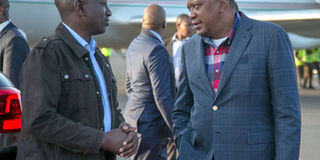Uhuru, Ruto need to change tack to secure legacy

President Uhuru Kenyatta is received by Deputy President William Ruto on January 14, 2018 at JKIA when he arrived from South Africa. PHOTO | PSCU
What you need to know:
The country no doubt needs clarity of vision to confront the ever-present challenges.
It’s incumbent for the political elite to pursue this path as the most pragmatic means to an end.
The time to trigger the national healing process is now, and the process must be driven extensively, from the villages and estates to the towns and cities.
Last year, Kenya went through two divisive presidential elections.
The Supreme Court intervened twice to determine petitions — nullifying President Uhuru Kenyatta’s win on August 8 but upholding the October 26 repeat poll that was boycotted by Opposition leader Raila Odinga. The reactions to both verdicts were expectedly varied.
So many questions remain unanswered regarding governance, accountability, justice and equity. The country no doubt needs clarity of vision to confront the ever-present challenges.
The foundations of the nation have been obviously tested. Further, it’s no longer a secret that our economy is under immense stress. Unemployment is also high.
The stability of the country can’t be assured if able-bodied citizens are idle, under-utilised and susceptible to manipulation by all sorts of negative forces.
This situation is worsened by the global rise of extremist ideologies which have inflamed terrorism, religious intolerance and political hostility.
TACKLE CHALLENGES
All these contribute to a weakened state, limiting its ability to tackle challenges like corruption and lack of accountability.
A complex combination of a weak economy, hostile political environment and unstable and an uncohesive social fabric is the sure recipe for a weakened state.
Kenya’s external and internal debt is also too burdensome to ensure any meaningful development can be achieved. The way out calls for a comprehensive interrogation of the national debt burden and push it to the fore of our national discourse. It is therefore incumbent to consolidate our collective energies to forge a united front in tackling our national challenges.
And this is what ought to concern us, as a progressive and foresighted country.
It’s important that we appreciate that deep national wounds remain open, and are still festering and hurting. These include psychological, material, ethno-cultural and political wounds, which are currently crying for redress.
NATIONHOOD
These wounds undoubtedly pose an existential threat to our nationhood if we ignore or wish them away casually.
It’s crucial that as a country, we should gather the courage to confront our fears, inadequacies and insecurities.
The national purpose must be to calm nerves, cultivate trust and reassure the disadvantaged body politic that not all has been lost simply by the Supreme Court judgment which upheld the results of the fresh presidential election as announced by the Independent Electoral and Boundaries Commission (IEBC).
The time to trigger the national healing process is now, and the process must be driven extensively, from the villages and estates to the towns and cities.
The winners need, as a matter of priority, to take the initiative and offer the hand of reconciliation, and the losers must equally be ready to engage in the project of pursuing national reconstruction.
It’s incumbent for the political elite to pursue this path as the most pragmatic means to an end.
JUSTICE
And the end is to promote justice, peace, nationhood, patriotism, inclusion, cohesion and the much-needed sense of belonging.
This project will only succeed if it’s founded upon the pillars of magnanimity, forgiveness, and a deliberate appetite for reconciliation. It’s therefore clear that this national healing process must be all-encompassing, comprehensive and honest.
But why choose this path of dialogue? It’s because every human society, Kenya included, ought to appreciate the value of a just, fair and equitable governance system.
Secondly, it’s because the Supreme Court, like any other court of competent jurisdiction, in the Anglo-Saxon sense, would only be preoccupied with matters of trite law, in spirit and substance.
This tight legal approach, deprives society of the much vital avenues for ventilating upon, and addressing social fears and aspirations.
EXCLUSION
The ethno-cultural fears of exclusion and marginalisation, can easily escape attention in a formal litigation, like the just concluded presidential election petitions of 2017. Such inherent legal limitations may prove catastrophic to the long-term health of the Kenyan nation.
In other words, human society extends way beyond rigid legal constructs. It deals with vertical and horizontal relationships, emotional attachments and subtle strategies for mutual coexistence.
Every society has her strengths, weaknesses, opportunities and threats, which may not be easily discerned during legal adversarial combat in courts of law.
The writer is a Public Policy Analyst. Public Research and Development Consultants (PRAD).




